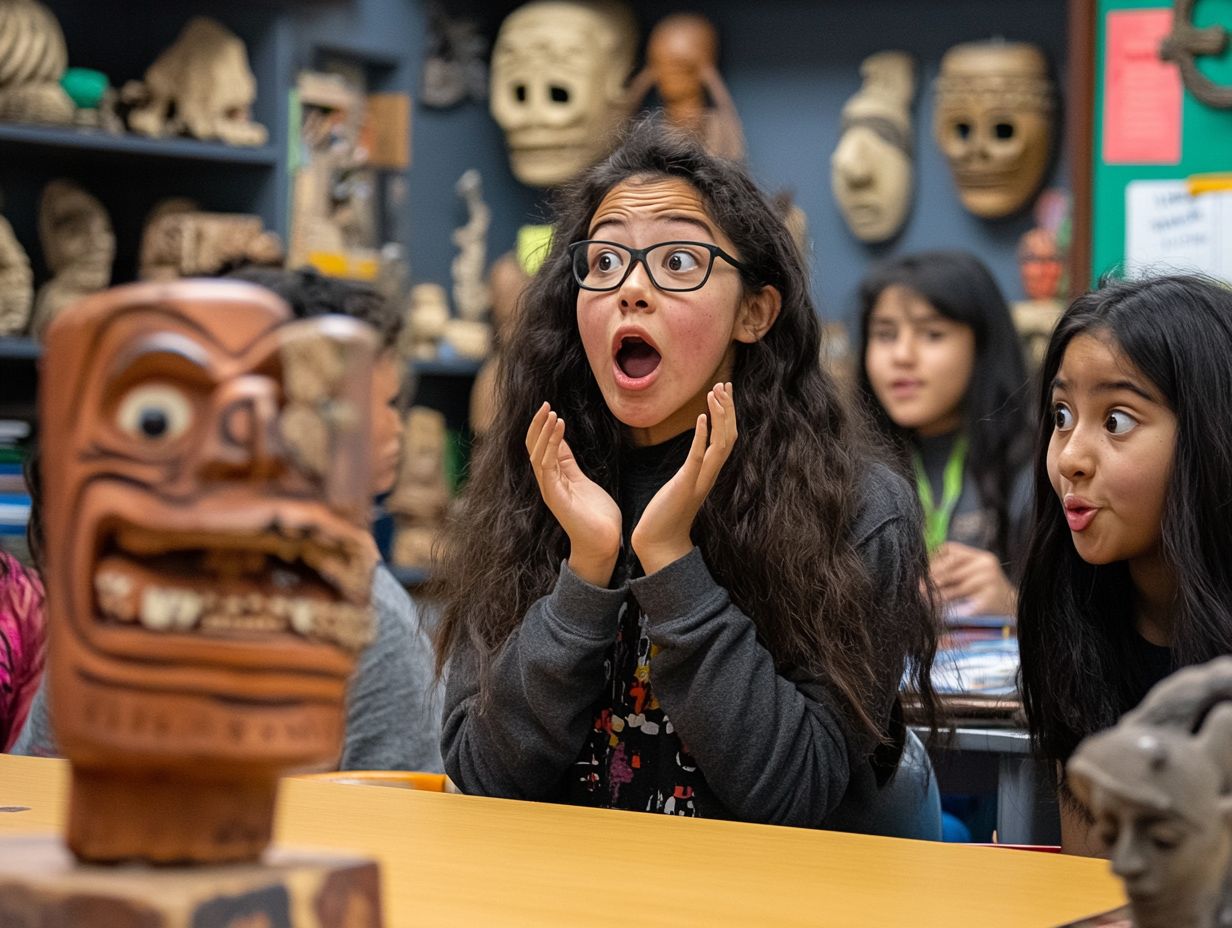Understanding the Impact of Culture Shock on Students
Culture shock is a familiar experience for students stepping into new cultural environments, often giving rise to feelings of disorientation and anxiety.
Let s dive into what culture shock really means! This exploration sheds light on its stages and the myriad factors that contribute to it. It examines how culture shock affects you academically, socially, and emotionally. You’ll find practical coping strategies and discover support systems that can help you along the way.
By grasping this experience, you can more effectively navigate your journey through unfamiliar surroundings.
Contents
- Key Takeaways:
- What is Culture Shock?
- Stages of Culture Shock
- Factors That Contribute to Culture Shock
- Effects of Culture Shock on Students
- Coping Strategies for Culture Shock
- Support Systems for Students Experiencing Culture Shock
- Frequently Asked Questions
- What is culture shock, and how does it affect students?
- What are some common symptoms of culture shock?
- How can students prepare for culture shock before studying abroad?
- What are some ways to cope with culture shock while studying abroad?
- Can culture shock have a positive impact on students?
- Are there any resources available to help students deal with culture shock?
Key Takeaways:

- Culture shock is a common phenomenon experienced by students when adjusting to a new culture, causing feelings of disorientation and discomfort.
- Individual traits and societal influences can contribute to culture shock, affecting your academic, social, and emotional well-being.
- You can manage and overcome culture shock by utilizing coping strategies and accessing support systems, such as resources and services provided by your institution.
What is Culture Shock?
Culture shock is a challenging feeling that you encounter as you navigate new environments and social norms in a foreign land. This emotional and psychological journey often surfaces during your transition from the comfort of familiar surroundings to a rich and diverse cultural landscape, resulting in feelings of anxiety and stress.
As you wrestle with language barriers, unfamiliar traditions, and homesickness, the challenges you face can profoundly affect your social interactions and academic aspirations.
Defining the Phenomenon
Culture shock refers to the emotional challenges you encounter when faced with a different culture. It can lead to social pressures and difficulties in getting used to your new culture.
For many, this experience evokes feelings of isolation as you navigate an unfamiliar environment. Everyday interactions can seem overwhelming. It’s not unusual for international students to wrestle with anxiety due to communication barriers and homesickness.
The journey of cultural adjustment typically unfolds in stages, starting with an initial thrill that eventually gives way to disillusionment. As you confront the reality of your new surroundings, you might swing between frustration and gradual acceptance, shaping your understanding and integration into the host culture.
Recognizing these emotional ups and downs is crucial for fostering resilience. This understanding allows you to adapt more seamlessly amidst the complexities of cultural immersion.
Stages of Culture Shock
The stages of culture shock often unfold in a predictable sequence. It begins with the exhilarating thrill of discovering a new culture. This initial excitement is soon followed by a crisis phase, where emotional discomfort can set in, leaving you feeling disoriented.
However, this journey culminates in an acceptance phase, where you adapt and find your place within your new environment. Along the way, you’ll need to cultivate a range of coping strategies to navigate the intricate web of cultural differences you encounter.
Adapting to a New Culture
Adapting to a new culture requires you to actively engage in unique activities and build relationships that facilitate your cultural integration.
For international students, this journey becomes significantly richer when you participate in various community events. These events showcase local traditions and provide a fantastic platform for meaningful interactions. By joining student organizations, you can connect with like-minded individuals and foster supportive networks that are crucial for navigating your new environment.
Exploring local cultural traditions whether they be festivals or culinary experiences allows you to appreciate diverse perspectives while sharing your own background. Through these interactions, you cultivate a sense of belonging, making the adaptation process smoother and far more fulfilling.
Understanding culture shock is crucial for your success! Embrace these experiences, and you’ll find your way in this new cultural landscape.
Factors That Contribute to Culture Shock

You may find that several factors play a role in your experience of culture shock. This feeling of confusion and anxiety can arise when you encounter a new culture. Individual traits, such as your personality, can significantly influence how you adapt.
Societal elements, like differences in culture and language, can heighten feelings of homesickness. This makes the transition even tougher.
Individual and Societal Factors
Your experience of culture shock is shaped by both individual factors, such as your personality traits and previous cultural exposure, and societal influences like social norms and the availability of emotional support.
These personal characteristics can either ease or intensify feelings of disorientation when you encounter unfamiliar cultural practices. If you approach new situations with an open mind, you may find it easier to adapt than someone who is resistant to change.
On the societal front, social norms can either smooth your path to adjustment or present obstacles. A supportive community can provide essential emotional backing, offering you a sense of belonging that s crucial during transitional times.
In contrast, rigid social expectations can hinder your ability to adapt, making culture shock feel even more overwhelming.
Effects of Culture Shock on Students
Culture shock can profoundly affect you as a student. It influences your academic success, social interactions, and overall emotional health. It often manifests as anxiety, withdrawal symptoms, and a decline in mental well-being, making it essential to recognize and address these challenges.
Academic, Social, and Emotional Impact
Students facing culture shock may find themselves under considerable social pressures that impact their academic ambitions and contribute to emotional discomfort in everyday interactions.
The unfamiliarity with new customs, languages, and social cues can create barriers that hinder effective communication and integration within academic environments and peer groups. This disconnection often manifests as anxiety, stress, or even isolation, complicating academic performance.
Engaging in supportive social networks, such as study groups or cultural clubs, is essential for alleviating these negative effects. By fostering open dialogue and sharing experiences, you can gain invaluable emotional support.
This helps bridge cultural gaps and enriches both your learning experiences and personal relationships.
Moreover, developing coping strategies like seeking peer mentorship or participating in workshops aimed at cultural adaptation enables you to turn challenges into opportunities for growth.
Coping Strategies for Culture Shock
Effective coping strategies are essential for resilient students. They can help ease feelings of anxiety and stress during this challenging time.
Embracing effective methods can enable you to navigate this challenging transition with greater ease and confidence.
Ways to Manage and Overcome Culture Shock

To effectively manage and navigate culture shock, immerse yourself in community events and seek emotional support. This fosters a richer cultural understanding and equips you with effective coping strategies.
Engaging in local festivals, workshops, or volunteer opportunities allows you to dive into the cultural nuances of your new environment. These experiences not only heighten your awareness of diverse traditions and values but also create opportunities for meaningful interactions.
Building a support network whether through fellow students, local mentors, or cultural organizations provides a crucial safety net. These connections can offer emotional reassurance and practical advice, helping to alleviate feelings of isolation.
By integrating into your surroundings and cultivating friendships, you develop emotional resilience, which is key to successful adaptation and your overall well-being.
Support Systems for Students Experiencing Culture Shock
Support systems are essential for students navigating culture shock. They provide a wealth of resources that include mental health services, faculty support, and opportunities to engage in student organizations. These elements work together to create a nurturing environment, enabling you to adapt and thrive in your new surroundings.
Resources and Services Available
You have access to a variety of resources and services designed specifically for students. These include mental health support, academic advising, and cultural education programs. These programs enhance peer relationships and ease your transition.
These programs are incredibly helpful for those experiencing culture shock. They offer a safe space to express feelings and navigate the challenges of adapting to new environments. Mental health counseling services help you build emotional resilience, allowing you to manage academic pressures while getting used to varied cultural norms.
Academic advising is essential in steering you through your educational journey. It keeps you on track as you adjust to a new academic culture. Cultural education workshops deepen your understanding and appreciation of diversity, enabling you to forge meaningful connections and seamlessly integrate into your new surroundings.
Frequently Asked Questions
What is culture shock, and how does it affect students?
Culture shock is the feeling of disorientation and discomfort that individuals experience when they are exposed to a new and unfamiliar culture. It can cause students to feel anxious, confused, and isolated, which can impact their academic performance and well-being.
What are some common symptoms of culture shock?
- Homesickness
- Difficulty sleeping
- Changes in appetite
- Irritability
- Desire to isolate oneself from others

How can students prepare for culture shock before studying abroad?
Students must prepare for culture shock to ensure a smooth transition. Research the country and culture you will be visiting, learn basic phrases in the local language, and connect with others who have studied abroad in the same location.
What are some ways to cope with culture shock while studying abroad?
Some effective ways to cope with culture shock include keeping an open mind, connecting with other international students, exploring the new culture, and seeking support from friends, family, or a counselor.
Can culture shock have a positive impact on students?
Yes, culture shock can have a positive impact by helping students develop a deeper understanding and appreciation for different cultures. It can also improve their adaptability, resilience, and problem-solving skills.
Are there any resources available to help students deal with culture shock?
Yes, many schools and organizations offer resources and support for students experiencing culture shock. These may include cultural orientation programs, counseling services, and cultural clubs or groups on campus.
Don’t hesitate to seek support or connect with available resources. Your well-being is important, and help is just around the corner!






